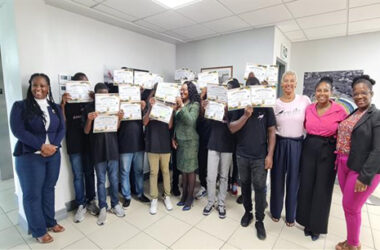This year’s annual Nobel Laureate Festival [NLF] winded down with some amazing productions —and by all accounts the presentation delivered by Dr. Adrian Augier at this year’s Sir Derek Walcott annual lecture series evoked much social discourse amongst literary critics and the wider civil society.
The NLF main presenters were Augier, economist, novelist and cultural entrepreneur/ activist; and UWI Head of the Sir Arthur Lewis Institute for Social and Economic Studies (SALISES), Professor Aldrie Henry-Lee.
![Image of Adrian Augier [PHOTO: Stan Bishop]](https://www.thevoiceslu.com/wp-content/uploads/2017/06/Adrian-Augier-mid.jpg)
The gist of the Sir Derek Walcott Lecture series, presentation focused on the social and economic equity for the people, as well as, preservation and upliftment of the ‘cultural norms’ ; as the country grapples with inherent issues along its projected journey.
Dr. Augier’s thought-provoking delivery elicited much response from the audience- limited in numbers due to COVID-19 protocols- but nevertheless,bold, affirmative and informative.
Earlier, in describing the pandemic’s global consequences that has impacted people’s social and economic life, moderator Dylan Norbert- Inglis said, “ we as a people today more than at any other point in our recent history have to feel constrained and look within to understand who we are , where we have come from and where we are going .”
To drive home his point, Inglis quoted from Derek Walcott’s ‘Love after Love’, which reads:
“A time will come with elation
You will greet yourself
Arriving at your own door
In your own mirror
And each will smile at each other’s welcome…”
To paraphrase an old adage, ‘It is within our power to decide our own destiny…and it’s we and we alone who possess that inherent right to determine our future’.
Among other accolades, Dr. Augier, in 2010, wasawarded the Caribbean Laureate for Arts and Letters from the ANSA Foundation. He has exemplified a colourful career in the fields of commerce and literature andhad this to say: “I have laboured in the shadows of both Laureates – Sir Arthur’s, because he is the father of development economics …and Walcott’s, because of my love affair with literature, theatre, painting and design, and carnival.”
“The boundaries between these two are often more fluid than we imagine and when they merge it is sheer magic!” he added.
While Sir Arthur was more of a “distant legend”, Sir Derek, said Dr. Augier, was “a recurring presence riding intoour lives from summer to summer with his exotic band of multi-colored, multi-talented characters better known as ‘The Trinidad Theatre Workshop’.”
Dr. Augier recalled that he was awestruck with the group’s performances, for beyond their mere talent “was the energy, uncompressed , unsuppressed, explored and expressed with confidence …they moved like the masters they sought to be and the master they sought to please, absorbed in their craft built with fragments of the places they were from.”
The phrase: “A Whole Country” is lifted from Walcott’s Nobel Lecture; ‘The Antilles – Fragments of Epic Memory’ and “…it appears in a passionate evocation of Caribbean culture, history, landscape where he exclaims how quickly it could all disappear,” said Dr. Augier.
He adds, the passage ends with his (Walcott’s) lament that, “a morning could come in which governments could ask what happened … not merely to the forests and the bays, but to a whole people.”
Dr. Augier recounts that Walcott’s worries were ‘real’ and echoed the sentiments of the people, as “for many of us who live here the fragility of our microcosm concerns us deeply, we feel the need to preserve our moorings to this place, the anchor of our being.”
He declared, “As a people,inseparable in many ways from the lands that we inhabit, we depend on our environment for our physical and spiritual wholesomeness, we wish to belong. For us who are still trying to reconcile separation, lost,restoration, it is important to belong;moreso, as the world intrudes with its untraceable money and limited appetite.”
That state which once protected us, finds us now at war with each other.“It is both terrible and sad that our battle for patrimony,shared spaces should bring us into such violent conflict with that very state that once stood as ‘defender and protector’,” lamented Dr. Augier.
“So, we must ask, how did we come to be at war with our governments, with each other; tribally divided instead of united in our common interest against the strife and discord which deems her childrens’ toil and rest?”
He said it is this same ‘strife and discord’ that is depicted in Walcott’s warning, “like a voice from the sea uncurling in an ancient conch, resonating all the angst of recent headlines, and how quickly it could disappear. And how it is beginning to drive us into where we hope are impenetrable spaces, green secrets at the end of bad roads…”
If we proclaim to be ‘sons and daughters of Saint Lucia …who love the land that gave us birth’ then how is it that “we cannot resolve this basic development dilemma of how to preserve our green secrets, our impenetrable spaces, while seeing too the economic needs of our people.”
He noted that in conflict between development and conservation, “there are examples aplenty of how to achieve balanced development, how to extract and retain responsible developers. There is global best practises …new models in our own heads and a reservoir of human decency in our hearts.”
Dr. Augier further contended that, “With these at hand, finding solutions to the dilemma of a degrading environment is merely a matter of wanting better, demanding more and having the mutual respect and resolve to bring solutions about.”
He added that, “Sensible resource utilization is driven most fundamentally by the essential principles of self-preservation. There is no real conflict here, only the illusion of false choices.”
In surmising the ‘sordid’ stature of people from the region, and referencing from one of Walcott’s poems, Dr. Augier declared: “Sadly we continue to dismantle the already incomplete understating of ourselves. How else to describe the castration of so many aspects of our culture ; the chronic underfunding of the arts, the archives, libraries, national trust , folk research centre , the closure of museums and bookshops.
“The pittance spent on education, the pimping of cultural traditions intoevents. If we are not to be fools in our own house and if we are not to be evicted, we need to understand our own ‘provenance’.”
“We must see and we must assert ourselves as ‘whole people’,” implored Dr. Augier. “Not as caricatures called taxi drivers, hotel workers, entertainers …all those obviating words, which perpetuate a kind of economic amenity. We must be ‘whole people’, ‘whole lives’, a whole nation, whole futures, nothing editedby circumstance or market jargon into a pretty postcard.”
He continued, “We need our fragments in order to dance, without losing our souls in the ‘gwan won’ of money and power.”





